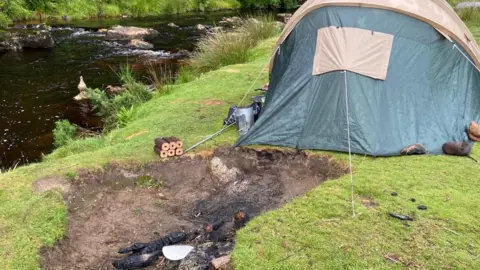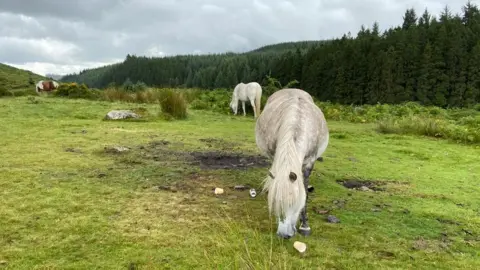Dartmoor camping ban over 'littering, human waste and fires'
 Dartmoor National Park Authority
Dartmoor National Park AuthorityCamping in parts of Dartmoor will be banned due to the volume of rubbish left by those staying overnight.
The Dartmoor National Park Authority said it is trying to stop large numbers of people using Bellever as an informal campsite.
One park ranger said he had "not experienced anything like this before", including "littering, human waste and fires" damaging habitats and wildlife.
The 27-day ban to allow the area to regenerate begins on Friday.
The park said the decision had been taken after a "dramatic increase" in camping and was needed to "protect public health, wildlife and nature".
 Dartmoor National Park Authority
Dartmoor National Park AuthorityTo assist rangers with enforcement, national park marshals will be employed from funding provided by the Devon and Cornwall Police and Crime Commissioner Alison Hernandez.
The authority said: "At Bellever there have been unsustainable levels of anti-social behaviour with littering, human waste and fires causing damage to habitats and animals."
'Risk to wildlife'
On one night in July, 70 tents were recorded at Bellever - also known as Riddon Ridge - and 50 fire pits were counted along a 500m (1,640ft) stretch of riverbank.
Refuse ranged from disposable barbeques, plastic waste and used toilet paper.
Simon Lee, the park's ranger team manager, said: "We've not experienced anything like this before across the national park.
"This unsociable behaviour is taking up lots of our time and poses a big risk to other people, wildlife and habitats."
Those camping with large tents or in large groups and with lots of equipment must go to a designated campsite with proper facilities, the park said.
The only type of camping allowed on specific parts of Dartmoor is backpack camping, a overnight stay of up to two nights.
Anyone who does so must carry their equipment in a rucksack and leave no impact on the environment.
